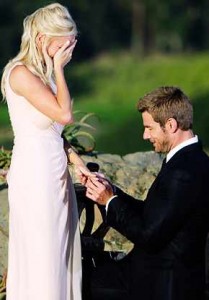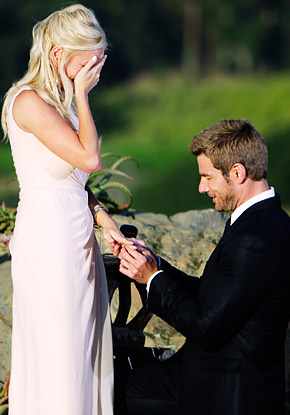
Upon the finale of my favorite love story reality show The Bachelor, I began to ponder the candor of the actual show: how real is it? What is part of the show (lights, camera, action) and what isn’t (the real, true emotions)?
I know that reality TV is not completely true. I know that every thing Brad Womack says is not 100 percent sincere, and most things are done for the cameras. I also know that the “dates” they put the couples on are not just for funsies. For example: Emily’s deceased husband was a race car driver. So what do they do? Make a date on a race track. Crazy evil Michelle is terrified of heights, so they rappel down a building. Obviously the producers make situations that are drama-prone for “good TV.” But when does the movie-making magic stop and the real feelings begin?
To answer this question, I categorized reality TV.
There are shows like Jersey Shore, The Hills and Bad Girls Club that are strictly for kicks and giggles. There is no substance, no information. Viewers tune in because the characters are not your average person. The contestants are from different cultures, have more money, or are just worse behaved, respectively. Some emotions are present, but the majority of the show is staged, with a situation presented, and the reality stars told to just go with it. It was a sad, sad day in the Schuler household when I was forced to face reality (pun intended). Looking back, I scoff at how naive I was. Wait, the Hills was fake? The entire show was staged? I remember my disbelief during the series finale when all the tom-foolery and lies were revealed. I came to terms with this fact, however, and my reality TV show watching experience was forever tarnished. my days of blissfull ignorance ended abruptly.
Then there are the reality shows like MTV’s True Life, Teen Mom and 16 and Pregnant. These shows are informational: These shows choose a select character and follow that character around telling a unique, interesting story. For example, Amber is a teenager having a baby on 16 and Pregnant. The show tells the story of her issues with the father, issues with her parents and difficulties finding a place for her and her baby to live. This TV is not TRUE, but it is more informative than its pop culture, super-facial alternative. The audience watches the trials and tribulations of each character and learns about their situation; it is more of a documentary than a staged reality show.
And then there are shows like The Bachelor. Competition reality shows, like The Bachelor, Dancing With The Stars, Survivor and The Amazing Race have fake, posed situations, but all the emotions are actually real. A star will win the disco ball trophy, a survivor will win a million dollars, and the winner of The Amazing Race will win their cash prize. At the end of The Bachelor, a girl will “win.” She will find TRUE love. Right?
The Bachelorette is a spin off of the Bachelor, and it is produced by the same people. The first Bachelorette ever was named Trista, and in the end, she chose Ryan. This show was aired in 2003. Trista and Ryan are now married and have two kids. How can a fake show result in such a real, sincere ending?
But every time my dad walks in the room, sees me watching reality TV and rolls his eyes, exclaiming “oh lord, this is such bologna,” I will explain to him that yes, I know. Most of the show is bologna. Most reality shows are bologna. I am not an ignorant teenage girl who believes everything I see on TV.
It’s reality TV only in the sense that the emotions are real. Directors and producers create situations to encourage true emotions because that is what viewers can empathize with; that is what they like it and why they thrive off of reality TV. The key to understanding reality TV is to trust each viewer’s sophistication that they can peel back the fake layers (of the onion, if you will) to get to the real, raw, true emotions. That is why I like reality TV. Not for the fights or the bad behavior, but for the emotions that I can relate to. Competition shows are relateable because I know the feeling of winning or losing. MTV’s reality TV is relateable because I can empathize with the emotions of the characters.
Even though most aspects of reality TV are garbage, the emotions are real. And that is why I watch it.

Leave a Reply